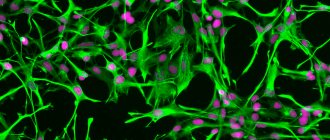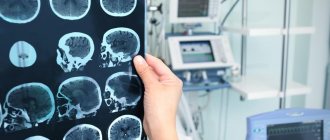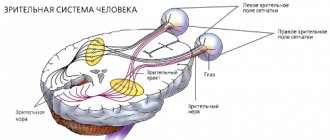Causes
For a long time, the main cause of vascular dementia was considered to be acute cerebrovascular accidents (hereinafter referred to as ACVA, which means, first of all, stroke). A stroke develops as a result of blockage of an artery by an embolus or thrombus (ischemic stroke) or when an artery ruptures and hemorrhages in the brain (hemorrhagic stroke). In this case, due to lack of nutrition, neurons die.
After a stroke, the likelihood of developing vascular dementia increases significantly. Within 1 year after a stroke, vascular dementia develops in a quarter of patients. The nature of the manifestation of symptoms depends on the area of the brain in which the disorder occurred. The size of the lesion also plays a role. Vascular dementia usually develops when more than 50 ml of brain volume is affected.
However, if circulatory disorders occur in areas important for cognitive functions (visual thalamus, hippocampal region, frontal prefrontal cortex, etc.), then a smaller area of neuronal death can lead to the development of vascular dementia. If other areas are affected, motor disorders and other post-stroke manifestations may occur.
It has now been established that vascular dementia is not always associated with acute disorders. It can occur due to a chronic dyscirculatory process - blockage of small vessels that occurs unnoticed by the patient (the so-called subcortical vascular dementia). It has also become possible to detect these disorders thanks to the spread of digital technology and the spread of neuroimaging methods in medicine.
Neuroimaging (functional MRI, PET, etc.) allows one to observe “silent” areas of vascular lesions in the brain that previously went unnoticed as not leading to an acute lesion (stroke). The development of vascular dementia is possible with a decrease in blood perfusion in the brain.
This occurs against the background of acute or decompensated chronic heart failure, a decrease in circulating blood volume, and a sharp decrease in blood pressure. All these phenomena lead to insufficient blood supply in the peripheral microcirculatory zones of all vascular beds and neuronal death. Based on this, the occurrence of vascular dementia is influenced by two components: stroke and a chronic discirculatory process. When these disorders occur simultaneously, they reinforce each other, leading to more pronounced symptoms.
Let's consider the mechanism of development of vascular dementia.
When the vascular link in various parts of the brain is damaged, neurons do not receive the required amount of oxygen and nutrients, which leads to the death of these cells. Initially, the brain compensates for the violations - they do not appear externally. Over time, the potential is depleted, negative changes begin to affect the state of memory, speech, concentration and speed of thinking. As a result of these cognitive disorders, a person’s behavior changes, and his independence decreases.
All types of vascular dementia account for up to 15% of all cases of dementia in the elderly. There are also often cases of mixed dementia, which combine vascular dementia with Alzheimer's disease. It is believed that as a person ages, the risk of vascular dementia decreases, while the risk of developing Alzheimer's disease increases.
In this regard, the vascular factor is recognized as especially dangerous in the Russian Federation, where life expectancy is still not very high and part of the population simply does not live to the age of onset of another type of dementia. Vascular dementia is also widespread compared to Alzheimer's disease in some Asian countries (Japan, China), and a number of Scandinavian countries (Finland, Sweden).
Risk factors for vascular dementia are:
- high or low blood pressure,
- cerebral atherosclerosis,
- hyperlipidemia,
- cardiac ischemia,
- diabetes,
- arrhythmias,
- hyperhomocysteinemia (now this factor is considered doubtful),
- pathology of heart valves,
- vasculitis.
Smoking, poor diet and a sedentary lifestyle contribute to the risk of developing vascular dementia.
Prevention of dementia
Eliminating the causes of dementia should begin at a young age.
- Quit smoking and alcohol. Abuse of bad habits causes cerebral infarctions and strokes.
- Play sports and exercise. Movement improves the exchange of oxygen in the blood, the cells receive constant fresh nutrition. Walking improves thinking and attention.
- Remove spicy, fatty foods with excess carbohydrates from the menu. Include fresh vegetables, fruits, nuts, cereals, fish and seafood in your diet.
- Avoid intoxication of the body. Do not choose work associated with hazardous production.
- Get tested regularly for blood sugar and cholesterol levels, and do an ultrasound of your internal organs.
- Train your intellect constantly: learn new information, a foreign language, a profession.
It is important to undergo a medical examination every year from a general practitioner, independently or from a labor organization.
Symptoms
As a rule, “vascular dementia” is diagnosed if cognitive impairment was preceded by a stroke. Quite often, accompanying signs are symptoms of focal brain damage, for example, manifestations of hemiparesis (weakness of the muscles of one side, anisoreflexia, pathological foot signs, etc.). A characteristic symptom is a walking disorder - a slow, shuffling gait and instability (which patients themselves often call dizziness).
As mentioned above, the cause of vascular dementia lies in circulatory disorders in the brain. The potential for disturbances to occur exists in different areas of the brain. Therefore, the external manifestations of vascular type dementia differ significantly in each case. Let's list the most typical ones.
Dementia caused by damage to the midbrain is manifested by mesencephalothalamic syndrome. The first manifestations are confusion and hallucinations. A person becomes apathetic, withdraws into himself, does not care about his appearance, and neglects personal hygiene. His psychophysiological state is usually characterized by increased drowsiness. In some cases there are speech disorders.
In dementia caused by damage to the hippocampus, first of all, there is an impairment in the ability of memory to retain information about current events (long-term memory can be retained).
As a result of a stroke, apathetic-abulsic syndrome is observed in the prefrontal regions of the frontal lobes. The patient behaves inappropriately, there is no criticism of the condition. Inadequacy consists in repeated repetition of one’s own words and actions, or the words and actions of others.
Subcortical lesions lead to disruption, first of all, of daily activities: it is difficult for the patient to concentrate on one subject and maintain one type of activity; problems arise with making plans. There is also a violation of the skills of information analysis (separation of the main from the secondary).
A stable sign of vascular dementia is impaired urination; it is observed in almost all persons suffering from dementia.
Symptoms of vascular dementia are also noticeable in the psycho-emotional sphere. There is a general decrease in mood and self-esteem, emotional instability, depression appear, and self-confidence is lost.
Personality changes
At the stage of atherosclerotic encephalopathy, a person loses his former personal qualities. This manifests itself in:
- loss of the former sense of humor, aggressive behavior in response to a joke;
- the inability to explain to him the figurative meaning of the phrase;
- misunderstanding of related phrases (for example, “father’s brother” and “brother’s father”);
- lack of ability to critically assess the situation.
There may be cases of the formation of ridiculous paranoid theories, rationalization proposals, and inventions. Patients are prone to litigiousness and complaints to all authorities. One of the common forms of vascular dementia in men is delusions of jealousy, and in women - complaints of theft.
Worsening dementia can lead to the development of:
- pathological stinginess and laziness;
- pronounced conservatism;
- loss of a critical attitude towards oneself;
- violation of moral standards;
- uncleanliness;
- vagrancy;
- collecting trash.
Hypochondriacal atherosclerotic neurasthenia forces the patient to purchase and take many medications out of fear for his health
Diagnostics
Dementia of the vascular type is diagnosed in the presence of clinical data, characteristic anamnestic or neuroimaging signs of cerebrovascular disease: previous stroke or cases of subclinical local cerebral ischemia.
It is also important to have a cause-and-effect relationship and a relationship in time between brain damage of vascular etiology and the development of cognitive impairment. The very presence of dyscirculatory disorders according to neuroimaging, as well as the presence of neurological disorders - hemiparesis, speech and swallowing disorders, walking and urination disorders, are mandatory.
It is necessary to differentiate between Alzheimer's disease and vascular dementia.
Once the syndrome of dementia is identified, it should be syndromicly distinguished from depression, moderate or even mild cognitive impairment and delirium. To diagnose depression, various questionnaires and tests should be used (clock drawing test, HADS anxiety and depression scale, Montreal Mental Status Scale, MMSE test, etc.).
The distinction between vascular dementia and dementia due to Alzheimer's disease is often difficult. If in Alzheimer's disease the deterioration can occur slowly and constantly, then in the case of vascular dementia the deterioration occurs suddenly (for example, after stroke) and proceeds in stages.
When the vascular component predominates, the following signs are common: focal neurological symptoms (rigidity, hemiparesis, bradykinesia, bulbar disorders), neuropsychological disorders depending on the location of the cerebral infarction (aphasia, lack of sensory sensitivity, apraxia), gait disturbances (with Parkinson-like or ataxic movements), urinary disorders with urinary incontinence and urgency.
In addition to a thorough neurological examination and targeted laboratory tests, MRI or MSCT is necessary to identify infarcts and white matter lesions.
It must be remembered that quite often the same patient exhibits both signs of vascular dyscirculation and symptoms of Alzheimer's disease. Modern research indicates that the chronic dyscirculatory process is a risk factor for the development of Alzheimer's disease and plays a pathogenetic role in the neurodegenerative process, based on this, the vast majority of cases of dementia are mixed in their pathogenesis - vascular-degenerative.
Differences from mental retardation
The diagnosis of “mental retardation or mental retardation” existing in psychiatry must be distinguished from the changes caused by vascular dementia. With oligophrenia, personality development is suspended under the influence of pathology, the mind of an adult remains at the stage of childhood, and intelligence never reaches the required level.
Most often, mental retardation does not progress, but appears as a result of a hereditary or acquired disease. In this case, the consequences of stroke and other vascular pathology do not play a significant role. Mental changes are detected in childhood.
Common signs may be:
- speech disorders;
- emotional disturbances;
- inappropriate behavior.
Treatment
Treatment of vascular dementia should be aimed at correcting the pathological factors leading to this condition, as well as directly correcting cognitive functions. It makes no sense to describe all kinds of treatment regimens and give the names of specific drugs with their course and single doses in this article, because each specific case requires an individual approach.
The general principles of therapy for vascular dementia should be the correction of hypertension and cholesterol levels (however, you should not reduce cholesterol levels below 3.5-4 mmol/l due to the risk of a combination of Alzheimer's disease and vascular dementia, and Alzheimer's disease reacts negatively to low cholesterol levels , although, unfortunately, it is not entirely clear why), as well as the use of antiplatelet or anticoagulant therapy.
It is important to carry out a course of treatment with antioxidant (Mexidol, Cytoflavin, etc.), neuroprotective (Actovegin, Ceraxon, Cortexin, etc.), vasoactive (Sermion, Cavinton, etc.) drugs, with individual selection based on availability contraindications in the patient and the clinical picture as a whole, as well as (the author’s opinion), anti-dementia drugs should be used, and the drug of choice should be memantines (Akatinol, Marux, etc.).
An equally important point is non-drug therapy, namely proper patient care and psychological comfort. After all, if you are surrounded by close people, and they treat you with a positive attitude, life becomes a little better.
Human rights
People with dementia are often deprived of the basic rights and freedoms available to other people. In many countries, physical and chemical agents are widely used to restrain patients in nursing homes and intensive care facilities, even though regulations are in place to protect human rights to freedom and choice.
Providing high-quality care for people with dementia and their carers requires appropriate and supportive regulations, based on internationally recognized human rights standards.
Forecast
At the present stage of development of medicine, the prognosis for recovery for any type of dementia is unfavorable. Dementia is considered to be an irreversible condition. There is also an unfavorable prognosis for work ability (a patient with dementia is a priori disabled), a relatively unfavorable prognosis for life, but vascular dementia itself is not the cause of the patient’s death.
Death often occurs due to cancer, acute vascular accident, and infectious lesions (especially important among which are diseases of the genitourinary tract due to poor hygiene in patients with dementia).
Total dementia syndrome
The term “total dementia” in psychiatry refers to gross forms of changes in the cognitive activity of the brain. These include:
- impaired abstract thinking;
- severely lost memory;
- complete loss of concentration;
- changes in the patient’s personality regarding compliance with moral standards (bashfulness, sense of duty, politeness disappear).
This form of dementia is more characterized by vascular and atrophic changes in the nuclei in the frontal lobes of the brain.
Neurological disorders
In the initial stage of the disease, neurological dysfunctions manifest themselves as general symptoms. Weakness and fatigue, absent-mindedness, and irritability appear. I am bothered by systematic headaches and sleep is disturbed. There is an unstable emotional background. Depressive states are possible. The person is unrestrained, hot-tempered, and embittered. Emotional incontinence usually manifests itself in violent crying or laughter, weakness.
Among other neurological indicators, cerebellar syndrome occurs, characterized by uncoordinated movements. It seems that the arms and legs are moving chaotically. Because of this, the gait changes: it becomes shaky, slack. The person appears to be drunk. Instability of the step provokes falls.
The disease causes accentuation of personality traits. For example, if previously a person was scrupulous and meticulous, then pathology turns him into a picky grumbler.
Pseudobulbar syndrome is expressed by a triad of signs:
- dysarthria - pronunciation disorder;
- dysphonia – loss of voice sonority;
- dysphagia – problems with swallowing.
There are cases of paralysis and paresis, but quite rarely. Muscle tone and reflexes are increased.
Quite often, malfunctions in the functioning of the pelvic organs occur, and epileptic seizures occur.
In general, dementia of vascular origin is characterized by narrowness and fixation of mental processes, loss of flexibility of thinking, fading of cognitive abilities, and a narrow range of interests.









